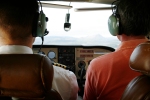English learning advice from Aviation English Asia. Article written by Michael Egerton
In this article I'm going to show you how you can improve your ability to paraphrase. Paraphrasing is the ability to express someone else's ideas in your own words. It is an essential skill for pilots and controllers, as there may be times when you need to communicate with other non-native speakers who don't know (or can't recognise) the words that you are trying to use. Therefore you should improve not just your own vocabulary, but learn how to communicate information clearly using other words and structures.
It's an effective way of checking, confirming and clarifying information. Communication strategies like this will contribute to making aviation safer.
Paraphrasing requires several skills:
- Good listening comprehension
- the ability to understand the main points of a message
- the ability to understand why the speaker/writer expressed himself this way
- the ability to express the same ideas in more concise terms without changing the meaning
This means that you need to develop the ability to use the context to understand the new vocabulary that you hear, while ignoring the parts that are not relevant to the main points. Pay attention to key words/phrases, tense and factual information. You can practice paraphrasing/summarising by picking out the key words/phrases in the text and expressing the way they are related to each other.
Practice paraphrasing while reading
In aviation you will probably be more concerned with improving your listening rather than reading, but nevertheless you can improve your paraphrasing skills by reading a varied range of text. When you read an article first skim read it to understand what the article is about and what the writer is trying to say. You should be able to guess the meaning of words that you don't know from the context. Then consider:
- What are the main points?
- What is the key information?
- What information is not useful?
- What questions does the article answer or raise?
You can then change the structure of the article to be clearer and easier to understand. If there are uncommon words you can describe them using different words. If the word represents something physical, eg a foreign object left on the runway, you can consider it's shape, size and dimensions or even the material it is made of. If the word represents something abstract eg "aerodynamics", consider the situations in which the idea occurs.
Exercise:
Paraphrase the following passage:
As mankind advanced further and further, throughout history there were lots of trials and designs for flying machines. In order to establish flying, mankind looked at the only available example of flying: namely birds. Thus, everyone was trying to copy the designs of the birds to design a flying machine that paralleled their development: The Ornithopter. In essence, an ornithopter was a machine that had birdlike wings and a place for the operator to be attached. The operator would flap his arms and the wings of the ornithopter would be flapped also. In essence, mankind would fly by simulating the flapping of the bird's wings. However, since the principles of aerodynamics were not yet discovered, no one was aware of the ratio of the wing to muscle power and thus all of these projects and attempts were doomed to fail. It should be easy to state the important information within a few sentences. It's easy to see which information can be discarded.
Exercise:
- Explain what an ornihopter is without using the word "birds".
- Explain why ornihopters were not successful without using the words "aerodynamics", "flapping" or "power".
Practice paraphrasing in aviation
Watch the following video.
- Do you think that the controllers were surprised to hear of that object on the taxiway?
- How do you think it got there?
- What other words sound similar or could easily be misheard?
- How would you describe that object if you weren't able to communicate clearly on the radio due to interference?
What to do next
For feedback and more information about Aviation English Asia’s courses please visit http://aviationenglish.com. If you haven’t already please join the Aviation English mailing list for special offers and details of courses in your area.


.jpg)